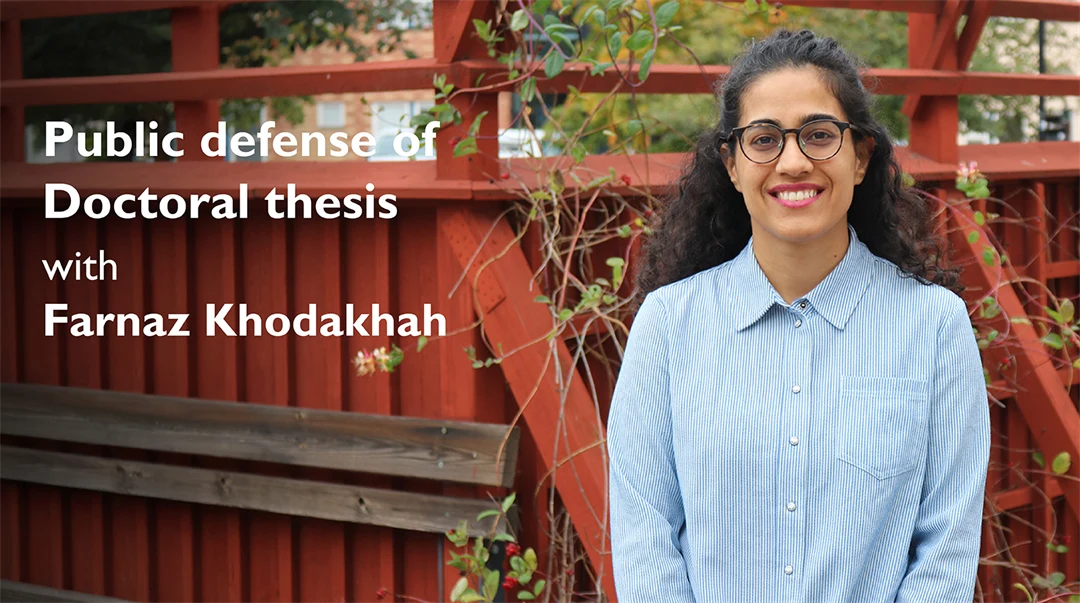Defence of Doctoral Thesis in Computer Engineering with Farnaz Khodakhah
Welcome to a public defense of doctoral thesis in Computer Engineering with Farnaz Khodakhah who will present her thesis "Medium Access Design for 5G and Beyond: Multi-Service Coexistence and Collaboration Strategies".
Farnaz thesis explores innovative solutions for medium access (MA) in next-generation wireless networks, ensuring efficient coexistence and collaboration across diverse services. By introducing novel non-orthogonal access techniques, this work addresses critical challenges in spectral efficiency, low-latency communication, and adaptive resource allocation for future 5G and beyond networks.
Date: April 24th, 2025
Time: 10:15 CET
Place: Campus Sundsvall, Room M108, M-building, Youtube and
Zoom: https://miun-se.zoom.us/j/69218651855
(Meeting ID: 692 1865 1855)
Doctoral thesis: Medium Access Design for 5G and Beyond: Multi-Service Coexistence and Collaboration Strategies
Respondent: Farnaz Khodakhah
Supervisor and Chair: Professor Mikael Gidlund, Mittuniversitetet
Co-supervisor: Associate Prof. Aamir Mahmood and Associate Prof. Patrik Österberg
Opponent: Associate Prof. Israel Leyva Mayorga, Aalborg University, Denmark
Examining committee:
Dr. Hans-Peter Bernhard, Silicon Austria Labs and Johannes Kepler University Linz
Associate Prof. Hossein Fotouhi, Mälardalen University
Dr. Kia Wiklundh, FOI, Sweden
Backup: Associate Prof. Leif Olsson, Mittuniversitetet
Abstract
The transition from 5G to beyond 5G presents fundamental challenges in medium access (MA) design, requiring efficient coexistence and collaboration across heterogeneous services. As networks evolve, MA strategies must become spectrally efficient to support diverse applications, including enhanced mobile broadband (eMBB), ultra-reliable low-latency communication (URLLC), and multi-user augmented reality (AR). To address these demands, this thesis proposes three non-orthogonal MA solutions: cooperative relaying for heterogeneous coexistence, collaborative transmissions for multi-user AR, and MA switching mechanisms for balanced multiservice integration.
The first contribution introduces a cooperative relaying framework using non-orthogonal multiple access (NOMA) for primary-secondary coexistence. A novel piecewise-forward NOMA (PF-NOMA) protocol integrates decode-and-forward(DF) and amplify-and-forward (AF) relaying, dynamically adjusting power and time allocation based on real-time conditions.
The second contribution focuses on latency-sensitive AR applications, wherehigh data rates, low latency, and energy efficiency are critical. A NOMA-based ratedistortion optimization framework is proposed, integrating adaptive power allocation to minimize video distortion while optimizing resource utilization.
The third contribution advances radio access network (RAN) slicing by introducing a hybrid MA framework that integrates NOMA, rate-splitting multiple access (RSMA), and puncturing for efficient resource allocation across slices with competing quality of service (QoS) requirements. By balancing age of information (AoI) and throughput, the proposed solution ensures scalable and adaptive resource management for URLLC and eMBB services.
Extensive mathematical modeling and simulation-based evaluations validate the proposed frameworks, demonstrating significant gains in spectral efficiency, reliability, and energy efficiency across diverse deployment scenarios. This work establishes a unified and adaptive MA paradigm, enabling seamless multi-service coexistence, fostering collaboration, and ensuring scalable resource allocation in future 5G and beyond networks.
